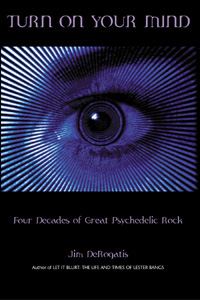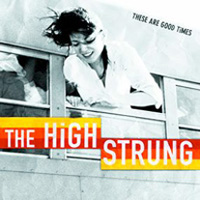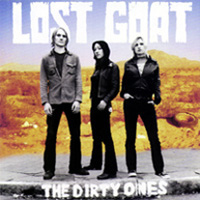 Turn On Your Mind
Turn On Your Mind
Four Decades of Great Psychedelic Rock
By Jim DeRogatis (Hal Leonard Corporation)
by Brian Varney
Kinda like the rock book equivalent of a “remastered with bonus tracks” reissue, Turn On Your Mind is an expanded reprint of DeRogatis’s out-of-print first book, which was originally published in 1996 with the title Kaleidoscope Eyes. The original manuscript has been tweaked where necessary, and extra pieces covering the eight years since have been added to bring the whole shebang up to date, complete with new artwork and title.
I’m a big fan of psychedelic rock and I like DeRogatis’s writing, so I’m glad to have this book around. As a source of information about bands that fall under the rather loose heading of “psychedelic rock,” the book is an invaluable source of information. However, as a book, it falls prone to several of the pitfalls that often plague books devoted entirely to one genre.
The biggest hurdle to such an undertaking is answering the question “What is psychedelia?” The book’s first chapter attempts to answer this very question, starting with the discovery of LSD by a Swiss scientist in the early 1940s, and the attempt to replicate the sensations caused by the drug’s “trip” in musical form by ’60s pioneers like the Beatles, Beach Boys, and the Grateful Dead, and the subsequent attempts by other bands to recreate not the drug’s experience (many of the bands covered in the book used no drugs at all) but the sound of records like “Good Vibrations” and Revolver, their “trips” coming not from drugs, but from drug-inspired music.
Fair enough. Exposition out of the way, DeRogatis begins to explore individual bands that he feels warrant mention as “great psychedelic rock.” This is where the questionable decisions begin to show themselves. Sure, I understand that any such collection is going to be colored by its author’s tastes, but some of the omissions and slights here are pretty baffling. For instance, he dismisses much of the San Francisco “Summer of Love” stuff (bands like Jefferson Airplane and the Grateful Dead) as being too folk-influenced to really warrant mention in a book whose focus is psychedelic rock. I’d be able to see his point if he didn’t go on to devote quite a few pages to Donovan, Nick Drake, and Incredible String Band, all of whom are admittedly great, but far more folk and far less rock than Jefferson Airplane or the Grateful Dead. This is not to mention the many words devoted to modern artists such as Moby, OutKast, Aphex Twin, and PM Dawn, all of whom may indeed display many of his tenets of psychedelia, but none of whom could be argued to be anything approaching “rock.”
In any case, I don’t want to spend too much time attacking inconsistencies in what is overall a very fine book. I walked away from the book with a list of records I need to hear, which in my opinion, is the mark of a fine rock book. As I said, any such collection is going to bear its authors biases, and frankly, I wouldn’t want to read a book that didn’t. As long as you don’t mind the book being, at least partially, the author trying to justify his record collection, I’d recommend this book to anyone with an interest in psychedelia.
(www.halleonard.com)



